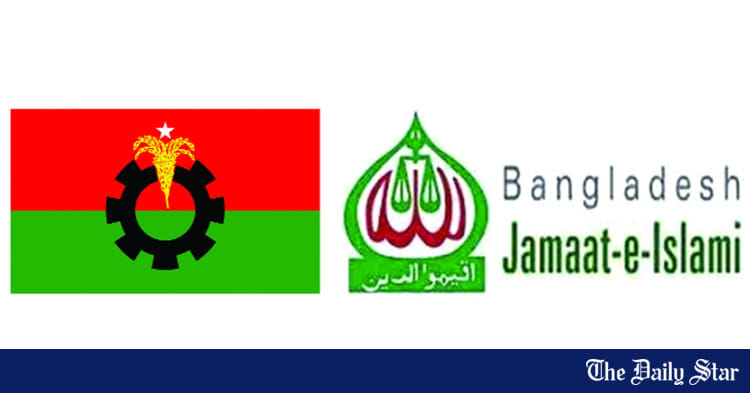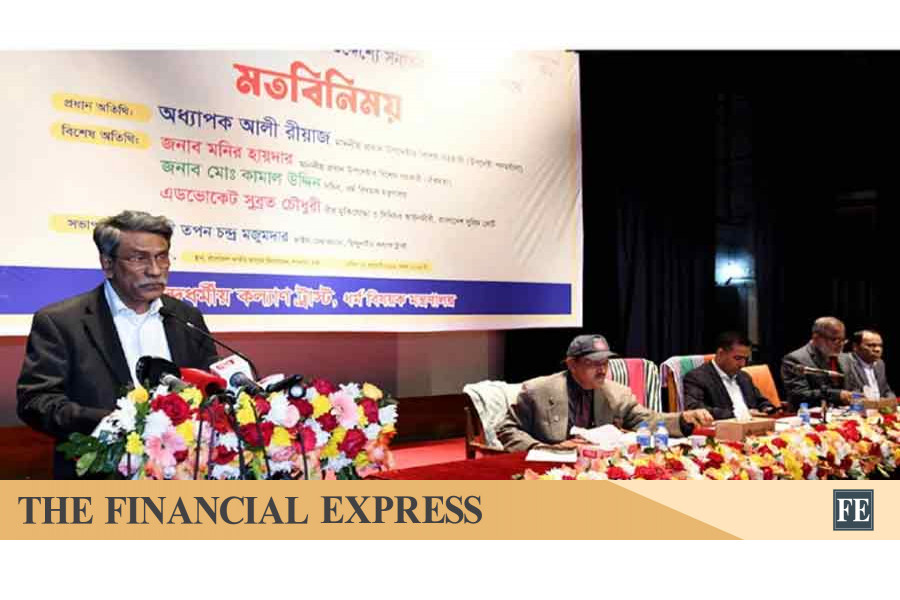Saif
Senior Member
- Joined
- Jan 24, 2024
- Messages
- 17,239
- Likes
- 8,332
- Nation

- Residence

- Axis Group


July Charter draft disappoints some political parties
A few political parties, including the National Citizen Party, on Sunday expressed their disappointment with the draft July National Charter 2025 that was shared with political parties concerned by the National Consensus Commission on Saturday...
 www.newagebd.net
www.newagebd.net
July Charter draft disappoints some political parties
Sadiqur Rahman 18 August, 2025, 00:20

AFP file photo
A few political parties, including the National Citizen Party, on Sunday expressed their disappointment with the draft July National Charter 2025 that was shared with political parties concerned by the National Consensus Commission on Saturday.
The draft charter is divided into three parts: a prologue outlining the historical context of the intended reform initiatives, a set of 84 reform issues accepted by the majority of parties, and a covenant.
Representatives of the parties dissatisfied with the draft told New Age that the prologue contains ‘partial’ history while the set of reform issues doesn’t spell out all the disagreements, and the covenant is ‘confusing’.
Parties, including the Bangladesh Nationalist Party, Bangladesh Jamaat-e-Islami, Khelafat Majlis, and Amar Bangladesh Party, said that they would convey their feedbacks by August 20 after discussing the draft on the party forum.
The Ganosamhati Andolan, Revolutionary Workers Party of Bangladesh and Bangladesh Jatiya Samajtantrik Dal-Jasod expressed some concerns about the draft while the Communist Party of Bangladesh and Gano Forum criticised the draft, saying that it undermined the constitution.
NCP joint convener Javed Rasin said that his party was frustrated with the draft charter. His party will express its concern to the consensus commission, he said.
‘There is no timeline. Although the covenant pledges to execute the immediately implementable reforms by the government, there is no guideline on the method of implementation,’ Javed said.
The last section of the eight-point covenant says that the signatories have agreed that any reform measures mentioned in the charter that are deemed immediately implementable shall be executed in full by the interim government and the relevant authorities without delay, prior to the next national elections.
Islami Andolan Bangladesh presidium member Ashraf Ali Akon termed the draft ‘incomplete.’
‘The historical context of the July uprising has only been partially reflected. Moreover, the draft does not mention that our party has strongly demanded a proportional representation system in the lower house,’ he said, adding that a meeting of the party’s highest body would decide its next course of action.
Gano Adhikar Parishad general secretary Rashed Khan strongly opposed the prologue. He complained that the interim government had skipped the ‘Quota Reform Movement of 2018’, which had inspired youths to stand against discrimination and the fascist Awami League regime in the charter.
‘We will express our concerns in the feedback. Our party will take it seriously if our concerns are not addressed,’ he warned.
BNP standing committee member Salahuddin Ahmed, Jamaat assistant general secretary Hamidur Rahman Khan Azad, AB Party president Mojibur Rahman Monju, and Khelafat Maslish secretary general Ahmad Abdul Kader said that their parties would review the draft and give feedback to the commission by August 20.
According to the draft covenant, the signatories will pledge to incorporate all the charter provisions in the constitution and prioritise the document over the existing law of the land.
The charter shall be deemed constitutionally and legally binding and hence its validity, necessity, or authority shall not be questioned in any court. The covenant also says that only the Appellate Division of the Supreme Court is assigned the authority to interpret its clauses.
Terming the provision against questioning the charter in any court as an ‘indemnity’, Communist Party of Bangladesh president Shah Alam said that such indemnity would damage the democratic essence of the constitution.
Bangladesh Jatiya Samajtantrik Dal-Jasod presidium member Mushtuq Husain said that no charter can be implemented by deviating from the democratic norms and principles in practice.
Ganosamhati Andolan executive coordinator Abu Hassan Rubel, however, said, ‘When a charter is prepared in the spirit of the post-uprising masses to change the existing laws and rules, it must be prioritised over the existing laws. Otherwise, the charter has no value or significance.’
He, however, added that the implementation of reforms related to the constitution must be mandated by voters, either through the election of a constitutional reform council or the parliament. The political parties would decide on the process of implementation.
RWPB general secretary Saiful Huq said that matters unrelated to the constitution, on which we have reached consensus, can be implemented immediately.
‘But those related to the constitution must wait for implementation by the next parliament. It will depend on political decisions whether a sovereign parliament legalises this covenant of the charter or not,’ Saiful said.
In the set of 84 ‘agreed’ reform issues, section seven says that the majority of parties have agreed on the inclusion of equality, human dignity, social justice, democracy, and religious freedom, and harmony as the state’s fundamental principles.
Although the CPB, Socialist Party of Bangladesh, SPB (Marxist), Gano Forum, and Bangladesh Jasod have demanded that the consensus commission must not keep the section in the charter, the draft mentions the parties as ‘dissenters’.
The CPB’s Shah Alam, the Bangladesh-Jasod’s Mushtuq Husain, and the Gano Forum’s general secretary Mizanur Rahman, strongly opposed the ‘misleading’ mention.
Mizanur said, ‘The Gano Forum has also dissented from Bangladeshi nationalism [Section 2 of the charter]. But the draft does not mention our party as a dissenter,’ he added.
Sadiqur Rahman 18 August, 2025, 00:20
AFP file photo
A few political parties, including the National Citizen Party, on Sunday expressed their disappointment with the draft July National Charter 2025 that was shared with political parties concerned by the National Consensus Commission on Saturday.
The draft charter is divided into three parts: a prologue outlining the historical context of the intended reform initiatives, a set of 84 reform issues accepted by the majority of parties, and a covenant.
Representatives of the parties dissatisfied with the draft told New Age that the prologue contains ‘partial’ history while the set of reform issues doesn’t spell out all the disagreements, and the covenant is ‘confusing’.
Parties, including the Bangladesh Nationalist Party, Bangladesh Jamaat-e-Islami, Khelafat Majlis, and Amar Bangladesh Party, said that they would convey their feedbacks by August 20 after discussing the draft on the party forum.
The Ganosamhati Andolan, Revolutionary Workers Party of Bangladesh and Bangladesh Jatiya Samajtantrik Dal-Jasod expressed some concerns about the draft while the Communist Party of Bangladesh and Gano Forum criticised the draft, saying that it undermined the constitution.
NCP joint convener Javed Rasin said that his party was frustrated with the draft charter. His party will express its concern to the consensus commission, he said.
‘There is no timeline. Although the covenant pledges to execute the immediately implementable reforms by the government, there is no guideline on the method of implementation,’ Javed said.
The last section of the eight-point covenant says that the signatories have agreed that any reform measures mentioned in the charter that are deemed immediately implementable shall be executed in full by the interim government and the relevant authorities without delay, prior to the next national elections.
Islami Andolan Bangladesh presidium member Ashraf Ali Akon termed the draft ‘incomplete.’
‘The historical context of the July uprising has only been partially reflected. Moreover, the draft does not mention that our party has strongly demanded a proportional representation system in the lower house,’ he said, adding that a meeting of the party’s highest body would decide its next course of action.
Gano Adhikar Parishad general secretary Rashed Khan strongly opposed the prologue. He complained that the interim government had skipped the ‘Quota Reform Movement of 2018’, which had inspired youths to stand against discrimination and the fascist Awami League regime in the charter.
‘We will express our concerns in the feedback. Our party will take it seriously if our concerns are not addressed,’ he warned.
BNP standing committee member Salahuddin Ahmed, Jamaat assistant general secretary Hamidur Rahman Khan Azad, AB Party president Mojibur Rahman Monju, and Khelafat Maslish secretary general Ahmad Abdul Kader said that their parties would review the draft and give feedback to the commission by August 20.
According to the draft covenant, the signatories will pledge to incorporate all the charter provisions in the constitution and prioritise the document over the existing law of the land.
The charter shall be deemed constitutionally and legally binding and hence its validity, necessity, or authority shall not be questioned in any court. The covenant also says that only the Appellate Division of the Supreme Court is assigned the authority to interpret its clauses.
Terming the provision against questioning the charter in any court as an ‘indemnity’, Communist Party of Bangladesh president Shah Alam said that such indemnity would damage the democratic essence of the constitution.
Bangladesh Jatiya Samajtantrik Dal-Jasod presidium member Mushtuq Husain said that no charter can be implemented by deviating from the democratic norms and principles in practice.
Ganosamhati Andolan executive coordinator Abu Hassan Rubel, however, said, ‘When a charter is prepared in the spirit of the post-uprising masses to change the existing laws and rules, it must be prioritised over the existing laws. Otherwise, the charter has no value or significance.’
He, however, added that the implementation of reforms related to the constitution must be mandated by voters, either through the election of a constitutional reform council or the parliament. The political parties would decide on the process of implementation.
RWPB general secretary Saiful Huq said that matters unrelated to the constitution, on which we have reached consensus, can be implemented immediately.
‘But those related to the constitution must wait for implementation by the next parliament. It will depend on political decisions whether a sovereign parliament legalises this covenant of the charter or not,’ Saiful said.
In the set of 84 ‘agreed’ reform issues, section seven says that the majority of parties have agreed on the inclusion of equality, human dignity, social justice, democracy, and religious freedom, and harmony as the state’s fundamental principles.
Although the CPB, Socialist Party of Bangladesh, SPB (Marxist), Gano Forum, and Bangladesh Jasod have demanded that the consensus commission must not keep the section in the charter, the draft mentions the parties as ‘dissenters’.
The CPB’s Shah Alam, the Bangladesh-Jasod’s Mushtuq Husain, and the Gano Forum’s general secretary Mizanur Rahman, strongly opposed the ‘misleading’ mention.
Mizanur said, ‘The Gano Forum has also dissented from Bangladeshi nationalism [Section 2 of the charter]. But the draft does not mention our party as a dissenter,’ he added.








































